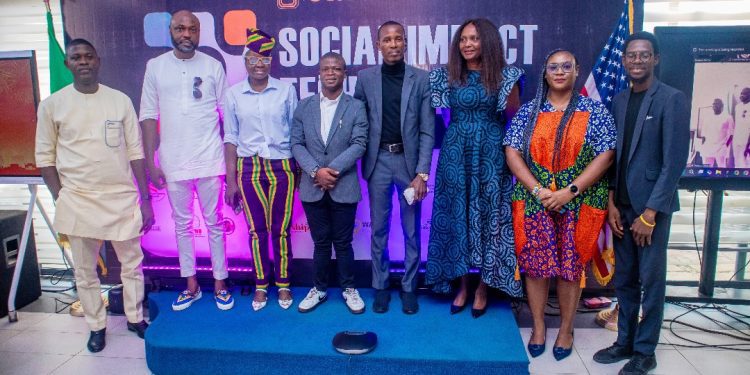The Social Impact Tech Summit 2025 (SITSummit) brought together key stakeholders from across Nigeria to address pressing challenges in digital inclusion, accessibility, and technological innovation.
With over 1,000 participants engaging both in-person and virtually from 23 locations, the summit served as a pivotal platform for exploring how technology can drive Africa’s development, particularly in bridging the digital divide and empowering persons with disabilities (PWDs).
The discussions, centered around digital inclusion, artificial intelligence (AI), blockchain, and environmental sustainability, offered a comprehensive look at the potential of technology to advance the United Nations Sustainable Development Goals (SDGs).
One of the key takeaways from the summit was the urgent need to bridge the digital divide, ensuring that marginalized communities have access to technology and the opportunities it provides.
Experts and panelists emphasized strategies such as affordable technology solutions, grassroots digital literacy programs, and the integration of inclusive design principles into tech products.
By prioritizing digital inclusion, stakeholders aim to expand access to education, healthcare, and economic opportunities, particularly in rural and underserved areas.
Speaking at the event, G.O. Lawal, Co-Founder & CEO of Coappt, underscored the summit’s goal of fostering meaningful partnerships that bridge technological gaps across sectors such as education, healthcare, and environmental conservation. He emphasized that SITSummit 2025 was not just about discussions but about driving real, impactful change across Africa.
A major highlight of the summit was a powerful address by Lois Auta, Executive Director of the Cedar Seed Foundation, who spoke on the critical need for accessible technology.
She highlighted the challenges PWDs face in accessing digital tools and urged developers to integrate inclusive design principles into technology from the outset.
“Accessible solutions benefits everyone, not just PWDs, as inclusivity drives innovation and ensures no one is left behind,” she said.
While moderating the session titled “Inclusion and Accessibility in the Digital Age”, Blessing Oladunjoye, the Publisher of BONews Service and Executive Director of BO Foundation for Inclusive Media (BOFIM), explained that it is important for tech developers and users to bridge the digital divide and to ensure that marginalized groups have access to digital tools and can engage seamlessly with digital contents.
The summit also featured a discussion centered around bridging the digital divide, particularly in Nigeria’s rural and marginalized communities.
Atinuke Odukoya, Director of the Centre for Women’s Health and Information, and Christopher Okeke, Product Manager at Huawei Technologies, discussed the need for affordable broadband and digital literacy programs. Odukoya specifically pointed out the disproportionate impact of digital exclusion on women and girls.
“We need targeted solutions to ensure that all communities are connected,” she stated, echoing the panel’s consensus that digital inclusion must be a priority.
Further discussing digital accessibility, Deborah Enyone Oni, Founding Partner of Hilton Top Solicitors, emphasized the importance of universal design in technology development.
“Tech solutions should be inclusive from the outset, not as an afterthought,” Oni said.
On his part, Julius Ilori, Founder of Learners Corner Education Tech Hub, discussed the role of education technology in bridging learning gaps in underserved areas, emphasizing partnerships as a key element for amplifying impact.
In a presentation during the summit, Oluseyi Oyebisi, Executive Director of NNNGO, shared how emerging technologies such as AI and blockchain are already being used to address global challenges like food security and healthcare. While acknowledging the challenges of scaling these technologies, Oyebisi stressed the importance of policy advocacy and grassroots innovation to ensure these solutions reach those who need them most.
A session on Artificial Intelligence for social good, featuring experts like Joshua Theophilus, VP of Product at SellMedia Group, and Judith Okonkwo, Founder of Imisi3D, discussed how AI can revolutionize sectors such as healthcare and disaster management. The panel examined ethical concerns, particularly around data bias and privacy, with Okonkwo urging the development of AI systems that reflect diverse perspectives.
“AI must be inclusive, ensuring equitable outcomes for all,” she explained.
Lekan Biliami Oba, Senior Special Assistant to the Governor of Lagos State, reinforced the importance of privacy-by-design principles, arguing that security measures must be built into digital solutions from the start. In a related discussion, Gabreal Odunsi, Program Manager at TechSocietal, emphasized public awareness on digital privacy as a crucial factor in building trust and encouraging tech adoption.
A session on technology’s role in social impact discussed how tech innovations are enhancing sectors like healthcare, education, and environmental sustainability. Olufemi Boboye, Managing Partner of Pelse Consult, and Audrey Akpevwe-Odogu, Senior Manager at eHealth Africa, discussed how tech solutions are transforming the delivery of essential services in underserved areas.
They also highlighted the importance of supporting startups and SMEs in Africa’s burgeoning digital economy. Boboye noted that leveraging technology for social well-being was one of the summit’s central themes.
The summit also introduced an immersive Virtual Reality (VR) experience, powered by Imisi3D, showcasing the transformative potential of VR in education, healthcare, and advocacy.
The VR experience demonstrated how emerging technologies can enhance learning and storytelling, sparking conversations on the role of innovation in driving social change.

